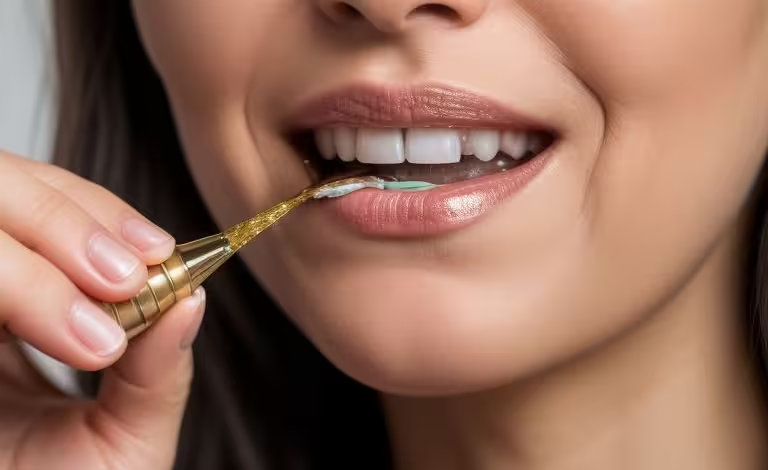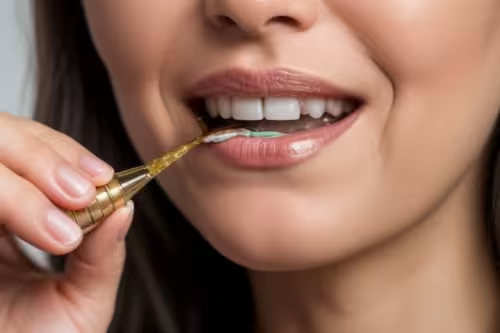7 Possible Reasons for a Metallic Taste in Your Mouth and How to Treat It

7 Possible Reasons for a Metallic Taste in Your Mouth and How to Treat It
Have you ever noticed a strange, metallic taste in your mouth that just won’t go away? It’s not just in your head—this sensation, known as dysgeusia, can be caused by a variety of factors. While it might seem like a minor annoyance, a metallic taste can sometimes signal underlying health issues that need attention. From medications and nutrient deficiencies to more serious conditions like kidney disease, the reasons behind this odd taste are diverse.

In this article, we’ll explore seven possible reasons you might experience a metallic taste in your mouth, how to address it, and when it’s time to seek medical help. Whether you’re dealing with this issue occasionally or it’s a persistent problem, understanding the potential causes can help you find relief and peace of mind.
What Causes a Metallic Taste in Your Mouth?
A metallic taste can be triggered by a range of factors. Let’s break down the most common causes and what you can do about them.
1. Medications
Explanation: One of the most common causes of a metallic taste in the mouth is medication. Many drugs can leave a bitter or metallic aftertaste. This is particularly common with antibiotics, certain blood pressure medications, and chemotherapy drugs. The reason behind this side effect often lies in how the body metabolizes these drugs and releases them into the saliva.
Examples:
- Antibiotics: Such as tetracycline or clarithromycin.
- Blood Pressure Medications: Such as captopril.
- Chemotherapy Drugs: These can alter taste perception significantly.
What You Can Do: If you suspect your medication is the culprit, consult your healthcare provider. They might adjust your dosage, switch you to a different drug, or suggest ways to manage the taste, like chewing gum or using mouth rinses. Never stop taking prescribed medications without consulting your doctor.
2. Pregnancy
Explanation: If you’re pregnant, you might be more familiar with a metallic taste than you’d like. This is a common symptom, especially during the first trimester, and is thought to be linked to hormonal changes. Increased levels of estrogen and progesterone can affect your sense of taste, leading to that unwanted metallic sensation.
Why It Happens:
- Hormonal Fluctuations: These can cause changes in taste perception.
- Morning Sickness: Related nausea and vomiting can also contribute to taste alterations.
What You Can Do: In most cases, this symptom will fade as pregnancy progresses. To manage it, try eating small, frequent meals, staying hydrated, and avoiding foods that worsen the taste. Some women find that sucking on lemon drops or chewing mint-flavored gum helps neutralize the metallic taste.
3. Poor Oral Hygiene
Explanation: Neglecting your oral hygiene can also lead to a metallic taste. Plaque buildup, gum disease (gingivitis), or tooth infections can alter your taste sensation. Bacteria in the mouth can produce sulfur compounds, which may be responsible for the metallic taste.
Common Issues:
- Gingivitis: Inflammation of the gums can alter taste.
- Tooth Infections: Abscesses or untreated cavities can lead to a metallic taste.
- Plaque Buildup: If not removed, plaque can harden into tartar, leading to taste changes.
What You Can Do: Improving your oral hygiene routine is key. Brush your teeth at least twice a day, floss daily, and visit your dentist regularly for cleanings. Using an antibacterial mouthwash can also help reduce bacteria in the mouth. If you suspect an infection, seek dental care immediately.
4. Nutrient Deficiencies
Explanation: A metallic taste can sometimes be a sign that your body is lacking certain essential nutrients. Deficiencies in vitamins like B12, zinc, and copper can affect your taste buds. Zinc, in particular, plays a crucial role in taste perception, and a deficiency can lead to taste disorders.
Deficiencies to Watch For:
- Zinc: Important for taste and smell functions.
- Vitamin B12: A deficiency can lead to neurological issues, including taste disturbances.
- Copper: Though less common, a copper deficiency can also impact taste.
What You Can Do: If you suspect a nutrient deficiency, a simple blood test can confirm it. Your doctor might recommend supplements or dietary changes. Foods rich in zinc (like meat, shellfish, and legumes), vitamin B12 (like eggs, dairy, and fortified cereals), and copper (like nuts, seeds, and whole grains) can help restore balance and improve your sense of taste.
5. Health Conditions
Explanation: Certain health conditions can also lead to a metallic taste. Chronic conditions like diabetes, kidney disease, and liver issues are often linked to taste disturbances. For example, in kidney disease, waste products can build up in the blood, leading to uremia, which can cause a metallic taste.
Conditions Associated with Metallic Taste:
- Diabetes: High blood sugar levels can affect taste.
- Kidney Disease: Uremia can lead to a metallic taste.
- Liver Disease: Toxin buildup can alter taste sensation.
What You Can Do: If you have a chronic health condition and notice a metallic taste, it’s essential to discuss it with your healthcare provider. Proper management of the underlying condition is crucial. This might involve medication, lifestyle changes, or more regular monitoring to prevent complications like taste disturbances.
6. Environmental Exposures
Explanation: Exposure to certain environmental toxins can result in a metallic taste in your mouth. Heavy metals like lead, mercury, and arsenic are notorious for causing taste alterations. Additionally, inhaling chemicals like pesticides, solvents, or paint fumes can lead to a metallic taste.
Sources of Exposure:
- Heavy Metals: Found in contaminated water, old paint, or industrial areas.
- Chemicals: From pesticides, solvents, or other industrial chemicals.
What You Can Do: If you believe environmental exposure is causing your symptoms, it’s vital to eliminate the source. This might involve filtering your water, avoiding certain areas, or using protective equipment when handling chemicals. Consult with a healthcare professional to determine if further testing or treatment is necessary.
7. Neurological Disorders
Explanation: Your taste buds are closely linked to your nervous system. Therefore, neurological disorders like multiple sclerosis (MS), Parkinson’s disease, or even a stroke can impact your sense of taste, leading to unusual sensations like a metallic taste.
Neurological Conditions Linked to Taste Changes:
- Multiple Sclerosis (MS): Can affect taste through nerve damage.
- Parkinson’s Disease: Taste alterations are common due to changes in brain function.
- Stroke: Taste can be affected if the stroke impacts areas of the brain responsible for taste.
What You Can Do: Managing a metallic taste related to neurological issues can be more challenging. Treatment will focus on managing the underlying condition. Your doctor may suggest seeing a specialist, such as a neurologist, to explore treatment options that can help alleviate your symptoms.
When to Seek Medical Help
While a metallic taste in the mouth is often harmless, it can sometimes indicate a more serious health issue. If you notice any of the following, it’s time to consult a healthcare professional:
- Persistent Taste: The metallic taste doesn’t go away after a few days, despite trying home remedies.
- Accompanied by Other Symptoms: Such as weight loss, fatigue, or changes in urination.
- Recent Medication Changes: Especially if you’ve started a new medication recently.
- Pregnancy Concerns: If the taste is severe or accompanied by other troubling symptoms during pregnancy.
Your doctor can help identify the underlying cause of the metallic taste and suggest appropriate treatment options. In some cases, this might involve blood tests, imaging, or a referral to a specialist.
Home Remedies for a Metallic Taste in the Mouth
If you’re looking for ways to get rid of a metallic taste in your mouth, there are several home remedies that might help. While these remedies won’t address underlying health issues, they can offer temporary relief.
- Stay Hydrated: Drinking plenty of water can help wash away the metallic taste and keep your mouth fresh.
- Chew Sugar-Free Gum: Mint-flavored gum or candies can help mask the taste.
- Use Mouthwash: An antibacterial mouthwash can reduce the bacteria in your mouth that might be contributing to the taste.
- Improve Oral Hygiene: Brush your teeth and tongue regularly, and don’t forget to floss.
- Eat Citrus Fruits: Sucking on a lemon or eating citrus fruits can help neutralize the metallic taste.
- Try Baking Soda: Rinsing your mouth with a solution of baking soda and water can help restore pH balance and reduce the metallic taste.
- Avoid Trigger Foods: If certain foods make the taste worse, try to avoid them until the taste subsides.
A metallic taste in the mouth can be an unsettling experience, but in most cases, it’s not a cause for alarm. From medications and pregnancy to poor oral hygiene and nutrient deficiencies, many factors can contribute to this sensation. By understanding the potential causes and addressing them appropriately, you can often find relief.
However, if the metallic taste persists or is accompanied by other symptoms



